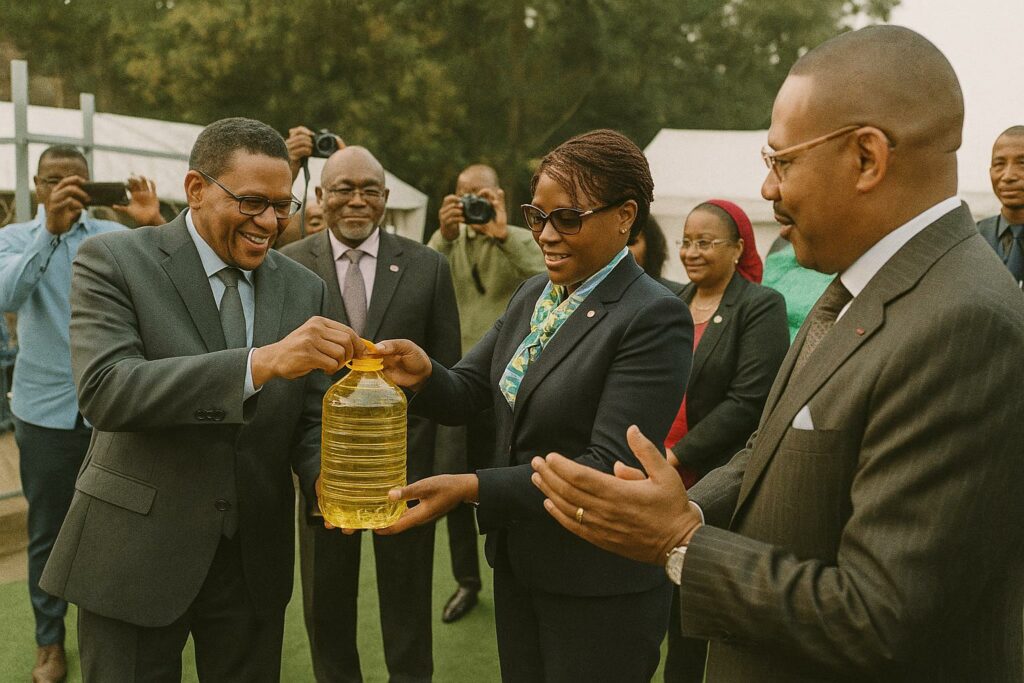Humanitarian urgency meets diplomatic pragmatism
In the pre-dawn quiet of 30 June, trucks bearing the blue insignia of several United Nations agencies rolled past the banks of the Congo River, where entire neighbourhoods still glistened under stagnant water. The convoy did not arrive unannounced: the Ministry of Social Affairs, Solidarity and Humanitarian Action had already activated its crisis mechanism, inviting the multilateral partners to reinforce an operation that was stretching domestic stockpiles. The symbolism of the hand-over ceremony—cabinet members Irène Marie-Cécile Mboukou-Kimbatsa and Juste Désiré Mondelé receiving relief kits from UN resident coordinator Abdourahamane Diallo—was not lost on observers. It encapsulated a doctrine of shared responsibility increasingly promoted by both Brazzaville and New York, in which sovereignty and solidarity can coexist without friction.
A calibrated government–UN synergy
Congo-Brazzaville’s authorities were the first to mobilise, establishing emergency shelters in Talangaï and dispatching mobile medical teams from the Ministry of Health. On the multilateral side, the World Food Programme assumed operational lead, pooling resources from UNICEF, UNDP and UNHCR in accordance with the inter-agency cluster approach (OCHA 2023). Officials are keen to emphasise that the arrival of 28 tonnes of rice, pulses, soap and water-purification tablets supplements rather than substitutes the national outlay already committed under the presidential decree on natural disasters of March 2022. As Gon Meyers of WFP put it, “Our consignment is calibrated to respect governmental priorities; we are amplifying, not redesigning, the response.” Such language underscores a maturing partnership in which external assistance reinforces rather than eclipses state capacity.
Mapping the scale of the deluge across Brazzaville
Preliminary satellite imagery from UNOSAT shows that rainfall exceeding 180 millimetres in forty-eight hours pushed the Oyo and Djiri tributaries to their highest levels since 1961. Talangaï, a low-lying arrondissement home to informal settlements, absorbed the brunt, with some 4,900 households reporting structural collapse. Current government tallies point to 28,076 individuals requiring immediate assistance, a figure corroborated by the Congo Red Cross and echoing the assessments of the African Development Bank following the 2020 flood season. The numbers, while alarming, are not unprecedented in Central Africa’s equatorial basin, where La Niña-linked anomalies have intensified pluvial patterns over the past decade (WMO 2024).
Logistics of relief: beyond the first consignment
Within forty-eight hours of arrival, the kits were redistributed to four staging points in Makélékélé, Ouenzé, Moungali and, crucially, Talangaï. To reduce bottlenecks, the Ministry of Transport waived toll fees for humanitarian cargo, while the Armed Forces provided flat-bottomed boats to navigate submerged alleyways. Yet officials are candid that one-off deliveries cannot meet the protracted needs of families whose dwellings lie in floodplains. Hence, a joint government-UN flash appeal—valued at 12.4 million US dollars—will be presented to bilateral donors in the coming days, with earmarked lines for shelter reconstruction, vector-control campaigns and psychosocial support. Discussions with the World Bank regarding contingency financing under the Cat-DDO instrument are reportedly advancing, although no formal announcement has been made.
Toward climate-resilient urban planning
Even as rubber boots and bottled water dominate headlines, planners inside the Ministry of Spatial Planning view the floods as a pivot for structural reform. Draft by-laws circulating in the national assembly propose obligatory elevation standards for riverbank construction and expanded green corridors to absorb excess runoff. UN-Habitat experts consulted by the cabinet highlight Kigali’s marshland restoration as a relevant precedent for Central Africa. President Denis Sassou Nguesso has repeatedly argued that adaptation finance should flow at the same velocity as mitigation funds, a position he reiterated at the Nairobi Africa Climate Summit in 2023. By anchoring the emergency within a broader climate narrative, Brazzaville seeks to convert a natural disaster into diplomatic leverage in forthcoming COP negotiations.
Regional and international implications
For neighbouring Kinshasa, seated just across the river, Brazzaville’s ordeal is a cautionary tableau of shared hydrological risk. The Congo Basin Commission, chaired this year by Cameroon, has placed transboundary flood-management protocols on its September agenda. Meanwhile, in New York, Congo’s permanent mission is lobbying for the inclusion of a specific reference to Central African urban flooding in the next UN Security Council debate on climate and security. Analysts note that while the current disaster is localised, its ripple effects—commodity supply disruptions, cross-border displacement, potential public-health outbreaks—carry undeniable regional weight. That, in turn, strengthens the diplomatic hand of a government determined to secure both immediate relief and long-term investment without surrendering policy autonomy.
Navigating the aftermath with measured optimism
As floodwaters slowly recede, the choreography between national institutions and multilateral actors remains under close watch from Brazzaville’s foreign partners. Early indicators—swift coordination, transparent data-sharing, and a discourse that frames vulnerability within the larger climate agenda—suggest a learning curve successfully negotiated since the 2019 inundations. Yet the real test will unfold in the coming months, when rehousing programmes either entrench or alleviate socio-spatial inequalities. For now, the image of Congolese officials and UN representatives standing shoulder to shoulder in Talangaï offers a narrative of resilience more powerful than any declaration: a city that may be learning to swim, but is determined to do so with its sovereignty intact.

